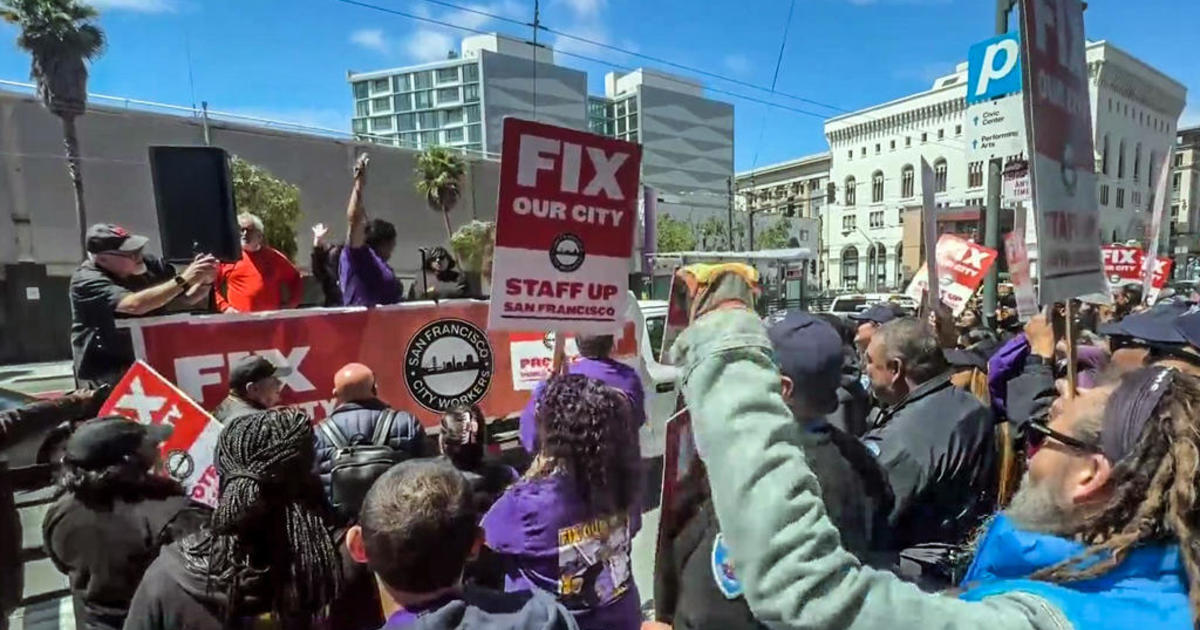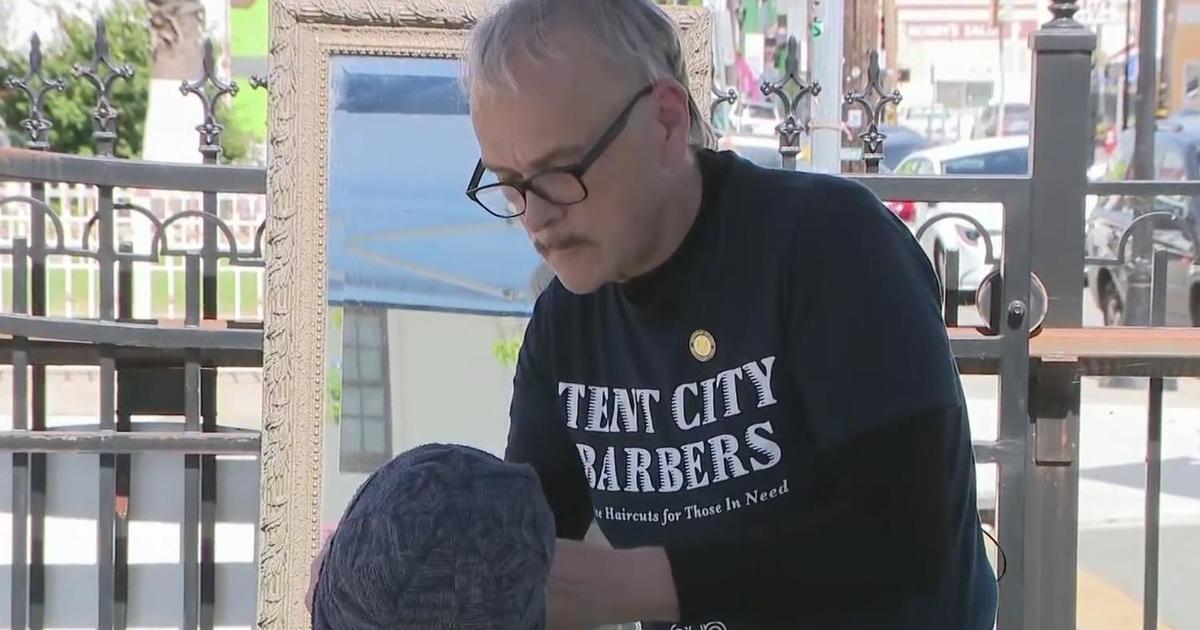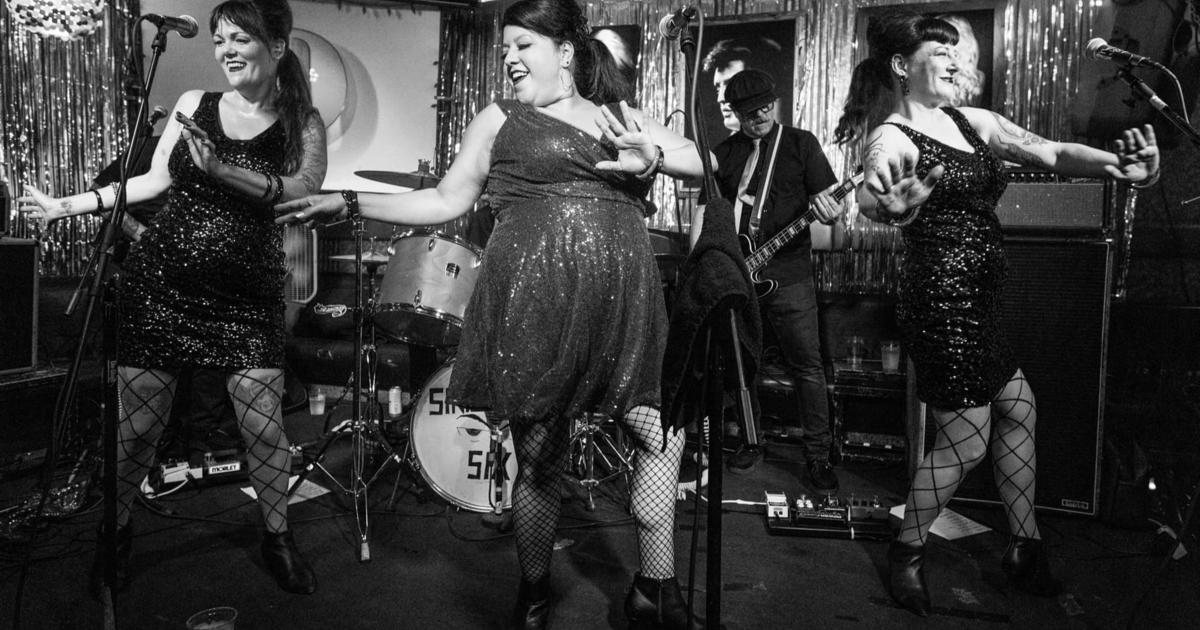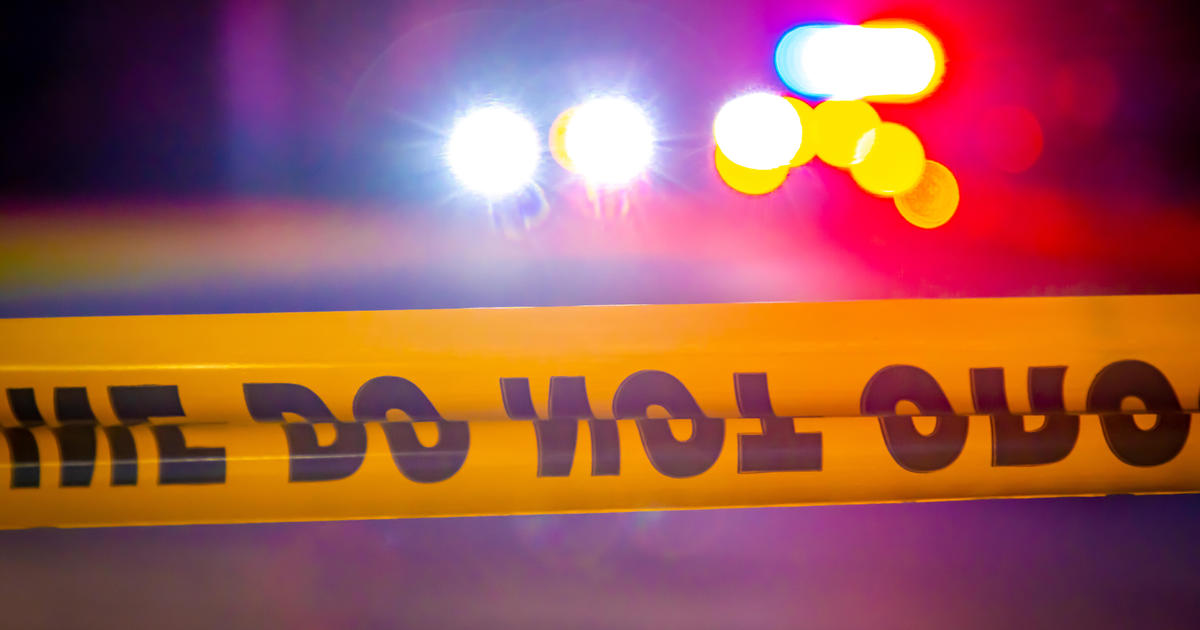British Rock Great Terry Reid Looks Back On His Career
SAN FRANCISCO (CBS SF) -- While he is sometimes spoken of as an "unsung" artist, the adjective is not an accurate way to describe cult British rock hero Terry Reid. Could a man who was once placed in the same company as the Beatles and the Rolling Stones by no less a singer than Aretha Franklin truly be called unsung? Under appreciated by mainstream audiences maybe, but there is no shortage of heavyweight artists who have showered the songwriter with deserved praise during his 50+ years in the business.
Reid has traveled a unique path from teen rock prodigy to sought-after frontman -- he was invited by Jimmy Page to tour with a pre-Led Zeppelin version of the New Yardbirds and pursued by Deep Purple guitarist Ritchie Blackmore before that band hired singer Ian Gillan -- to idiosyncratic, genre-spanning songwriter. The singer joined his first band at the tender age of 13, leaving school three years later to join Peter Jay and the Jaywalkers. The band was included as part of a package tour with the Stones, Ike and Tina Tuner and the Yardbirds in 1966 that stopped at the Royal Albert Hall.
A year after Peter Jay split up the band, Reid found himself leading his own trio and was signed to a management deal with well-known London producer Mickie Most (The Animals, the Jeff Beck Group and Donovan). It was that agreement and touring commitments that kept him from taking guitarist Page up on his offer to sing with the New Yardbirds. However, Reid would tell friends Robert Plant and John Bonham about Page's new project and introduced the parties, essentially setting in motion the formation of what would become one of the biggest bands in history.
It was during the next couple of years that he cultivated his solo career, releasing early landmark albums Bang, Bang You're Terry Reid and his self-titled follow-up that mixed extended covers of songs made famous by Dylan, Donovan and Cher with original tunes. Reid also established a reputation as a powerhouse live act, touring the states in support of the Rolling Stones (on their notorious 1969 U.S. tour, though he would skip the disastrous tour-closing festival at Altamont), Cream and Fleetwood Mac.
The singer would eventually clash with Most, who wanted to mold Reid into a pop crooner. The rift would leave the songwriter in creative limbo for several years. Though he put together an acclaimed band featuring American multi-instrumentalist David Lindley that played the Isle of Wight Festival and Glastonbury, touring to wide acclaim, it wasn't until Atlantic Records head Ahmet Ertegan used his considerable influence to free Reid from the contract so he could record again.
Working in the studio with British engineer Eddie Offord before decamping to Los Angeles for more sessions with studio genius Tom Dowd, Reid and company crafted the deeply personal, sublimely funky songs of River that mixed Latin and Brazilian influences into soulful, jazz-inflected excursions that recalled Van Morrison and Tim Buckley. Too esoteric for a major-label marketing plan, the album would lead to an eventual split with Atlantic and another crossroads for Reid.
He recorded two more albums that would later be hailed for their original approach -- the Graham Nash-produced Seed of Memory in 1976 and Rogue Waves two years later. But by the beginning of the '80s, Reid had turned to session work with Bonnie Raitt, Don Henley and Jackson Browne to pay the bills and largely stopped recording music under his own name. He would eventually revive his solo career, recording songs for soundtracks and playing live with the likes of guitarist Mick Taylor and keyboard player Brian Auger. Reid has continued to deliver his inimitable vocals and indelible songs to fans in the U.K., but his tours around the U.S. have become less frequent despite residing in the SoCal desert town of La Quinta.
Reid is embarking on a rare American tour this weekend, playing the Chapel in San Francisco on April 10 with backing from local prog/psych group Once and Future Band prior to heading off for a week of performances on the East Coast and subsequent dates in the U.K. He spoke with CBS online about his long career and plans to issue a double album of unreleased early '70s recordings for River by noted Northwestern label Light in the Attic entitled The Other Side of the River.
CBS SF: I remember missing a show you did back about ten years ago at Mezzanine. Is this the first time you've played San Francisco since then?
Terry Reid: Yeah, I think that was the last time I played up there. Though I did do one thing that was out in the Mission District. That was more of an open air street fair thing I did for a friend of mine, right? But I haven't played San Francisco for years. I used to; at one point I thought I lived there [laughs].
CBS SF: How did you hook up with Once and Future Band for this show?
Terry Reid: Well, Joel [Robinow, keyboard player and guitarist] and I had played together at that show you mentioned. I played with him then with Howlin' Rain. So that's what the connection was. So rather than just doing it solo, which I do a lot of things, I figured it would be great to get together with the lads. We'll have a day's rehearsal and we'll go from there.
CBS SF: So you just let them know what material you'll be covering?
Terry Reid: Yeah, I sent them a whole bunch of stuff that I'm doing, so they're getting their heads around that. Then when we get up there we'll see what we've got.
CBS SF: I noticed the club website's posting on the show says you'll be playing songs from River. Will you be touching on some of the unreleased tunes from the forthcoming Light in the Attic collection as well?
Terry Reid: Yeah, there's two or three songs there that would make sense, but I won't know until we rehearse them whether they're going to train wreck or not, you know [laughs]? You never know with that. But "Avenue" is one. There's a different version of it on The Other Side of the River. I recorded it originally in England with Eddie Offord as the producer. Then when I came here to the States to finish the album -- we did half there and half here -- I worked with Tom Dowd.
I'm really good friends with Tina Turner and the Ikettes and had worked with her band for years. The Ikettes were around and I was hanging out with them and the drummer Soco Richardson and I said, "Look, I tell you what. I hear you all singing the backgrounds on this song." And they went "Yeah! OK!" [laughs] And that was that. I ended up with four of the Ikettes in the studio doing backgrounds.
But on the original River album, Tom didn't use that track. He just used the basic one of us doing the song. But the version on the new record is the one with the Ikettes singing, which is tremendous. I actually don't know how that slipped by, but there you go. We had no end of tunes.
CBS SF: I know about your hand in Zeppelin's history, but in doing my research for the interview, I learned all of these details about you that I had no idea about. One of the biggest revelations in reading about River and the new collection of unreleased songs that is coming out in May was your connection with Gilberto Gil. I'm a huge fan of his...
Terry Reid: Me too! I can roughly explain that. Before Gilberto was in England, he was in Brazil and was saying "Thing have got to change! People need their freedom!" and everything. And at the time, it was more or less a police state in Brazil. They were like Argentina, right? And they [the government] didn't take lightly to that at all and told him "Get out of Dodge!" you might say, but it was Rio [laughs]. They told him to leave the country, so then he had to get political asylum to go somewhere.
I wasn't involved in it necessarily, but my attorneys in England -- and they still are, Sheridans of London -- they are barristers for the high court in England where they make those decisions. It came across Bernard Sheridan's desk one day about this musician Gilberto Gil being thrown out of Brazil with his family and the whole deal. And he was a very wealthy man at the time; he was like the equivalent of the Beatles in Brazil. So he asked me, "Have you heard of this gentleman Gilberto Gil?" And I said, "Yeah! I've got all his records! He's fantastic!" So Sheridan already has this all in motion with Parliament that England was going to give him political asylum. France and Italy and all these other countries had turned him down. So voila, Gilberto and his whole family were flown to England.
So the next thing I know, I'm playing this big gig called the Isle of Wight Festival with Jimi Hendrix and the Who. There's 300,000 people out there and it's just madness, right? And it's raining, of course, 'cause it's England [laughs]! People are sort of putting up with that, but there's people from all over the world. So I go onstage to play the gig, and I'm looking out into the audience, and there's this face! I know you'll say "Well, 300,000 people..." -- but he was 200 yards back into the center of the audience. You do pinpoint on different faces, and I kept coming back to this face that was grinning and grinning, and he had all this hair. And I think, "What a lovely smile!"
So I finish the set, but I couldn't take me eyes off of him. I'm wandering around afterwards backstage through the mud, and all of a sudden, this guy with the smile comes running up to me with a tear in his eye and threw his arms around me! And I went "That's the guy I was looking at!" And he's babbling on in Brazilian Portuguese, because he didn't speak English at all when he came to England. So he's going on and on, and say, "Whoa whoa! I was looking at you. You're lovely! What's your name?" and he said "I'm Gilberto Gil."
And I just about passed out in the mud! I said "You've got to be joking!" So he'd heard the story through Sheridans how I'd said so many nice things about him. He was at the Isle of Wight Festival to see everybody else too [Gil and fellow Brazilian exile Caetano Veloso also performed at the festival], bur from that point on, we became really dear friends.
I had a little cottage in the countryside, way in the middle of nowhere. And he came up there. At first it was him and a friend of his, then it was him and five people. Then it was him and ten people with his whole family: his wife, his sister and his second cousin. They'd be cooking and we'd be playing until God knows what hour. I've never had so much fun in my whole life [laughs]!
If you can imagine, it was like having a tribal event in the middle of the British countryside. All the people who lived around there were wondering what was going on [laughs]. There were drums and cuica [a Brazilian percussion instrument] and all these strange noises. So needless to say, when we went into the studio to record River, I'd been hanging out with Gil up there and I said "Well, why don't you come on down." So it was him and Caetano Veloso -- he's the biggest thing in Brazil now, but he was very young at the time. He was up and coming.
CBS SF: So how did the recordings that make up The Other Side of the River get unearthed?
Terry Reid: When this started, a friend of mine with Warner Bros. was investigating finding all the masters to do a box set of my material. And when he's looking, he finds a whole row of two-inch tapes, and he's thinking to himself, "How much money did they spend just in tape?" But back in those days, you rolled tape all the time. Then he looked up all the mixes and came up up with 24 pieces of material that were totally different than what was on River. Songs that didn't make it on River at all.
So he called me up and said, "Did you know about this?" I didn't! Over the years, you never know where they move your tapes, because the company owns the tapes. They could be anywhere. It hadn't crossed my mind to go back and looking at them. He put them on a CD and came out here and I was pleasantly surprised to find that a lot of them were really put together. So we did a deal with Light in the Attic and they were all interested in it and we're putting the album out.
CBS SF: From what I was reading, during the litigation with Mickie Most you and your band couldn't record in the studio, but you did play a lot live...
Terry Reid: Thanks to Ahmet, he stepped in and made the move. He said to me that he was fed up with me being stuck. And thank God that I just said "Screw the lot of them!" and just went out and put a really good band together with Alan White [drummer for John Lennon and later Yes] and [Ike and Tina Turner bassist] Lee Miles and David Lindley. It was a real bizarre band. What are they doing? It was a little bit country, some rock and roll and R&B. It was a mixture of everything, including Brazilian.
We just went out on the road and did a whole circuit through England and Europe. It's ironic that you can sometimes become more popular on a working basis that some groups that have actually had a hit. It's sort of what the underground has become now with the Internet. There are a lot of bands who record their own albums and tour and pack places and have a hit record without having a record company. Because now you can independently do it. Back then, you couldn't do it. You needed the distribution and everything. But now the Internet provides that.
CBS SF: So are there other live recordings of that band besides the performance at the Isle of Wight Festival that still exist on tape? I was also surprised to read that Michael Giles from King Crimson was in the band at one point...
Terry Reid: He played one gig with us because Alan couldn't make it because he was with John Lennon doing the album Imagine. I think it was the Isle of Wight. So we scrambled around and were trying to figure out who we were going to get. And Michael was nice enough to come in and play with us. The thing is with that, if you got the gig you've gotta do it.
But there's hundreds of recordings. Between bootlegs and people on the Internet getting a hold of me and asking "Oh, have you heard this?" And I remember doing it, but I haven't heard it [laughs]. And I can remember, as soon as somebody plays me it, I can immediately tell you exactly what gig it was or where it was, at least within one or two gigs. These things come out of the woodwork with the Internet.
But the thing is I'm concentrating here in the moment. It's funny how things happen all at once. It'd be nice if when you're not doing anything that they happen. At the moment, I've been working with Joe Perry and we've been writing things for his new album. We've done four songs already. And I'm working with ['70s Aerosmith producer] Jack Douglas. I've known Jack for years and I admire him immensely. So we're working up at Johnny Depp's studio, which is a fantastic studio in LA. It's top of the line.
So there's a bunch of us working there on Joe's album, and when we finish that, we're going to start on a solo album of mine. We were talking one night and that's what they decided they want to do. It's not for me to say [laughs]. Hopefully! When it happens it happens, and that will be even better. But we've been talking about it and we're planning it.
Johnny Depp is all into it too. I didn't realize he'd been a fan of mine for years. He knew all my songs. I thought he was way to busy for all that. He's a good guy. He's the nicest guy and he just loves the music. That's really what he wants to do, but then that other job came along [laughs].
CBS SF: I know David Lindley is still actively touring and recording. Are you in touch with Lindley and have you ever thought to try and reconnect with him?
Terry Reid: I know where he is. I haven't approached him about doing that, but at any given time I'd love to go back and play with Lindley. I still play with Lee Miles the bass player [from Reid's early '70s band]. We did a gig in Long Beach just a few months ago with James Gadson on drums, who played on a couple of my albums.
CBS SF: One of my all-time favorite drummers. The stuff he did with Bill Withers just kills me...
Terry Reid: Oh man, he wrote the book! We went down to James' house and he's got this garage rehearsal studio. We worked up the tunes and then went on stage and played them totally different [laughs]! It's sort of like playing Morse code playing with those guys. They just mentally feel the whole thing out. It was so much fun. Somebody recorded it and I was listening back to it, and it was astonishing how we communicated with each other. It was very free form. You don't have to concentrate really. You just go for it.



